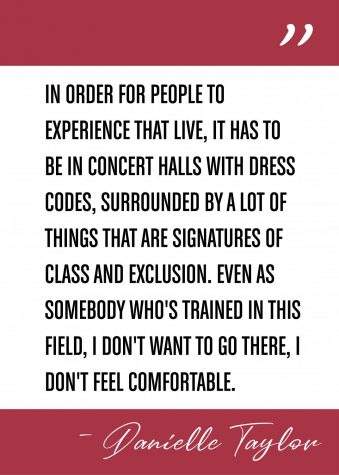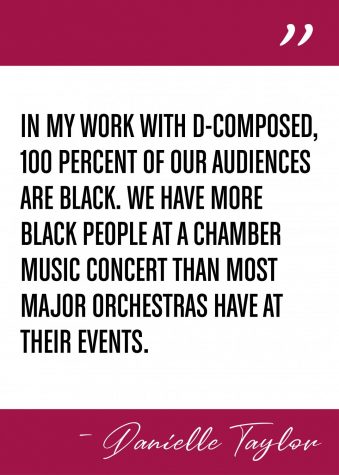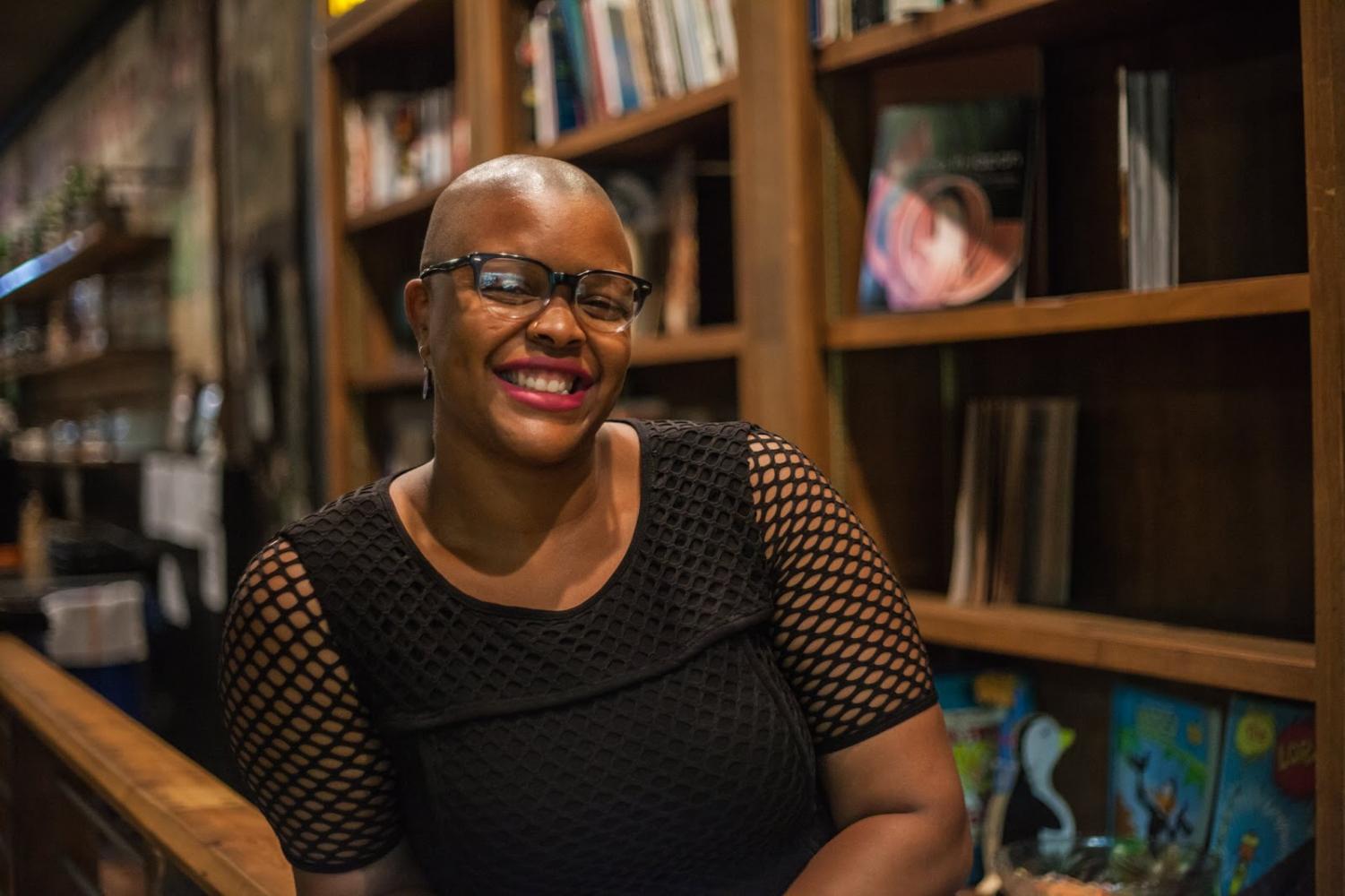Instrumental Change
NU alumna Danielle Taylor pushes for increased access in the classical music world
January 28, 2021
The Monthly
For Danielle Taylor (Bienen M.M. ‘19), teaching classical music in her hometown of Oakland, Calif. was heartbreaking.
Taylor taught in underfunded public schools that were only a few miles away from where she grew up, with Black and brown kids being the largest demographic. White, wealthier kids, meanwhile, were mostly the ones coming to her private studio lessons. As a result, she was seeing the difference that financial resources made in the classical music world, back-to-back, within the same day.
“I think that was part of the early fire that was really born inside me about being passionate about access,” Taylor said. “Because I saw kids in the public schools who were phenomenal musicians, who wanted to play all types of music on their instruments. To look at these kids who were passionate about it, and to know that it was close to impossible for them to continue — it felt criminal.”
Taylor later moved to the Chicago area and pursued a master’s in violin performance at Northwestern, adding to undergrad degrees in African American studies and violin performance from Oberlin College & Conservatory.
She’s active in a long list of Chicago organizations that are shaping a more diverse, inclusive and equitable vision of classical music. And last spring, she was named the Project Inclusion manager of the Chicago Sinfonietta, a nationally acclaimed orchestra that champions diversity and equity efforts. Project Inclusion offers nine-month professional fellowships to diverse musicians, composers, art administrators and conductors.
“Working with Danielle has been one of the highlights of [the program],” current fellow Michelle Di Russo said in a statement. “One of the qualities that I admire most about her is her authenticity. She has no fear to show us who she is and to create safe spaces for us to develop freely as artists while we search for our true selves.”
An alumna of the program herself, Taylor is now responsible for keeping up with the 14 fellows, planning monthly career development sessions and connecting them to helpful resources. Di Russo added that Taylor also creates space for topics beyond just music, holding wellness and empowerment sessions, as well as check-ins where fellows can talk about how social and political changes have affected them.

In the American classical music industry, the Sinfonietta stands out in diversity. People of color represent over 35 percent of the orchestra’s musicians, 58 percent of its board, 73 percent of its associate board and on average 46 percent of its audience.
But as a whole, the field of classical music is not known for those demographics. White musicians accounted for nearly 86 percent of all musicians in 2014, according to a League of American Orchestras Report based on a survey of its members. That world wasn’t the one Taylor grew up in.
Her musical world was informed by the aesthetics of Black music, from gospel and funk to hip hop and R&B. She said she thinks it’s part of Black culture to view music as a communal experience, as something that is more meaningful the more people engage with it. Singing in church from a young age, she said she knew her music was powerful and speaking to people if they sang, clapped or stood up — if they made it a conversation.
But in much of her classical music training, she said, there was an implicit demand to adopt a different and almost oppositional way of listening to, understanding and expressing music.
“There was a lot of, it felt like, constraints and restrictions from how I express the music,” she said. “[In terms of the] playing, but also how I stood and all of these other things, that felt like there were more walls there that were very unfamiliar to me.”
She said it can be very hard to separate the word classical from the culture it represents. But she stressed that the music itself is evocative and relevant. Just a few weeks ago, for example, she heard Beethoven coming from her teenage brother’s room and discovered that he plays symphonies while video gaming because they feel magnificent and powerful, an appropriate accompaniment.
“But I think in order for people to experience that live, it has to be in concert halls with dress codes, surrounded by a lot of things that are signatures of class and exclusion,” Taylor said. “Even as somebody who’s trained in this field, I don’t want to go there, I don’t feel comfortable. And so when we talk about it on that level, I’m like, ‘I agree with you. It’s not the music though.’”
In 2017, Taylor co-founded D-Composed, a Chicago-based string quartet that celebrates Black culture and creativity, and takes their musical performances into places like cafes, museum galleries and botanical conservatories.
Tahirah Whittington, the cellist of the ensemble, said Taylor often leads impromptu breakouts into song and dance during rehearsal. As the artistic director, Taylor is also instrumental in the cultural aspect of D-Composed concerts, which exclusively feature works by Black composers, including pop artists like Solange and Lizzo. D-Composed events also often have interactive elements, such as collaborations that fuse live classical music with a yoga class, or spoken word performances.
“In my work with D-Composed, 100 percent of our audiences are Black,” she said. “We have more Black people at a chamber music concert than most major orchestras have at their events. And so, it’s not actually rocket science. You have to know what people want, you have to be able to understand the culture of space, you have to understand that all of that matters.”
She’s said she’s watched orchestras and organizations spend tens of thousands, even millions, of dollars trying to figure out how to reach the Black community, yet be unwilling to hire Black people. And to her, that embodies the definition of white supremacy: investing in still being able to make the decisions, and believing that you are the most qualified to do so on behalf of another community.

Blair Milton, an adjunct professor at Bienen, said a couple decades ago, diversity, equity and access weren’t really even points of discussion in the classical world. Milton, a former professor of Taylor’s, has performed in the Chicago Symphony for over forty years.
At Bienen, he said performance faculty are now encouraging and even insisting that students playing recitals include at least one work by a composer from an underrepresented background. Milton said that last year’s racial reckoning, along with the #MeToo movement, has brought issues of diversity and equity into more mainstream conversations in the classical world.
“But Danielle’s way ahead of the curve on that,” Milton said. “She was holding meetings like this and getting people together for years.”
Milton added that when Taylor was getting her master’s degree, on top of the organizations she was part of, she was also managing her responsibilities as a mom and staying involved with diversity and inclusion projects at NU and D65 schools, including as a co-founder and co-facilitator of the Black Parents of King Arts group in Evanston.
Yet despite all these accomplishments, Milton said what’s most impressive about Taylor is what’s not on her resume. As his grad assistant, he said she took the initiative to set up a mentorship program between grad and undergrad students.
“She has a way of bringing people together that allows them to be comfortable with each other,” he said. “She opens lines of communication. She has a way of allowing topics to be discussed and solved that somehow don’t get addressed otherwise, she just works effectively with everybody she meets.”
Whittington said this is Taylor’s gift. Even though the two have only known each other for a few years, she calls Taylor a sister. Over the pandemic, she said Taylor started a group for Black musicians that meets twice a week on Zoom and has become a close-knit community, despite the fact that many have never met in-person.
In general, Taylor is well-connected to Chicago’s community of Black classical musicians, which she credits partly to the fact that the community isn’t large. When Taylor hears of a Black musician in the city, she said she immediately looks to be introduced to them so they can play together and find opportunities for each other.
“So many of us went through our decades of training in isolation, isolation as in being the only Black person for all these years, so it’s quite joyous for me,” Taylor said.
In the future, Taylor said she wants it to be natural, not surprising that Black people write and perform classical music.
To her, this is a social justice issue. People are being denied more than just access to music and learning music, she said. They’re being denied access to a different way of being in the world. That’s why she takes it so personally when people are not serious about equity work.
“I’m still the kid at a public school in Oakland,” Taylor said. “And I have no tolerance for people who say that kids who grew up in the neighborhoods that I did, who grew up like me, don’t deserve to be in a field or are less than anyone else.”
Email: [email protected]
Twitter: @jenniferzhann
RELATED STORIES:
— In Focus: One year after petition, Bienen students, faculty push to diversify music curriculum
— Aca-Believe It: How Ogi Ifediora rode a wave of a cappella to a career in music

